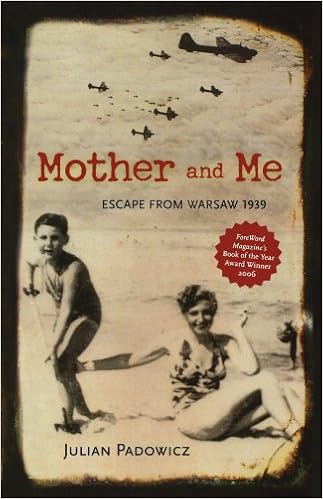Today's guest of honor is Julian Padowicz, author of acclaimed Mother and Me memoir series chronicling the adventures of an introspective Jewish boy and his beautiful self-absorbed mother who fled from Warsaw during the Holocaust. Despite the heavy subject matter, the memoir has a picaresque quality. Today Julian joins us to discuss his acrid mystery Writer's Block, recently republished by Ravenswood Publishing. If you are familiar with Julian's memoirs, you will recognize some of the archetypes in his novel as well. His life adventures certainly provide enough material for fiction.
______________________________________
MJN: There is a buzz phrase
known as "First World Problems" - the kind of problems that 90% of
the world population would love to have. The blurb to Writer's Block begins
with, "From his miserable childhood to his mediocre career as a college
professor, fate had not been kind, or even terribly fair, to Kip." We all
have our own definitions of what constitutes "miserable",
"mediocre" or "fair". Were you being sarcastic and playfully
deprecating when you described your protagonist's college professor career as
"mediocre"?
JP: For a starter, Kip was born a Jew in Hitler Germany.
When his mother brought him to America, she put him in boarding school, because
she was young and ambitious, and had no room for him in her life. Then, in
wartime America, he had to face his classmates with the name, Adolf. Does that
qualify him for the word, miserable? But that's just a start. When he graduated
college, his mother wanted him to join her in running the several dress
boutiques she had accumulated from the generosity of her gentlemen friends, so
Kip went to graduate school, half a continent away, where he hoped he
would be out of her reach. There his boarding school childhood and adolescence
with no parental input made him vulnerable to an older woman needing a husband.
I would say Kip's problems are fairly serious.
MJN: Having read all your Mother & Me memoirs, I can tell that some of the characters and plot lines in Writer's Block are based on your own experiences as a quiet, observant child of a resourceful but narcissistic mother. Here is a crazy thought. Have you ever considered writing a work of fiction in which the roles would be reversed? Have you thought of creating a mother figure that was homely, socially withdrawn and defiantly self-sacrificing, doting on her rakish, bon vivant son?
JP: That's an interesting idea, but, on reflection, I would
have to say that the kind of mother and son that you suggest are outside my
realm of experience. What I can say, however, is that I'm currently working on
a series of children's stories about a mother figure who is warm and caring and
responsible and all the things that Kip and I always longed for our
mothers to be.
MJN: I commend you on depicting the romantic adventures of a ... mature lover. In our youth-obsesses culture, romantic tension between people over 45 is considered almost distasteful. It's portrayed in a morbid or comical light. Most readers can read through the flashback to Kip's juvenile sex encounter in the car, or his early ill-fated marriage, but when we see him in the proverbial autumn of his life, courting a mentally disturbed woman, some readers might say "Ewww... Old people dating." I think of of the reviewers actually commented on the novel being "too sexual".
MJN: I commend you on depicting the romantic adventures of a ... mature lover. In our youth-obsesses culture, romantic tension between people over 45 is considered almost distasteful. It's portrayed in a morbid or comical light. Most readers can read through the flashback to Kip's juvenile sex encounter in the car, or his early ill-fated marriage, but when we see him in the proverbial autumn of his life, courting a mentally disturbed woman, some readers might say "Ewww... Old people dating." I think of of the reviewers actually commented on the novel being "too sexual".
JP: "Writer's Block" is a sexual book. Kip is a
man who has missed out on most of his allotted sex life, as he has of much that
he believes he should have enjoyed. This book and its sequels deal with a man
at the edge of old age, making up for the things he has missed.
MJN: In my review of the novel, I pointed out that Kip is a bit of a Peter Pan. He's sixty-eight going on fourteen. The fact that he is not burdened by a traditional family, that he doesn't have four kids and ten grand kids, continues to nourish that Peter Pan complex. And yet he is not a confirmed bachelor. In fact, he still has paternal longings for his estranged stepdaughter, who he had not seen since the divorce. Approaching seventy, he is still a wide-eyed seeker of true love.
MJN: In my review of the novel, I pointed out that Kip is a bit of a Peter Pan. He's sixty-eight going on fourteen. The fact that he is not burdened by a traditional family, that he doesn't have four kids and ten grand kids, continues to nourish that Peter Pan complex. And yet he is not a confirmed bachelor. In fact, he still has paternal longings for his estranged stepdaughter, who he had not seen since the divorce. Approaching seventy, he is still a wide-eyed seeker of true love.
JP: I couldn't have said it better myself. Yes, my Kip is a
special person. Not only is he so sensitive and so shy that he has missed out
on much of life, but, like his over-achieving, though
non-nurturing mother (or Scarlet O'Hara, for that matter,) he has a
special spark of optimism, mixed with his own sense of right and wrong. And,
probably because of his mother's shortcomings, he has a strong urge to nurture
people.
MJN: As writers, we both know that we don't dictate when inspiration will strike. I find that I do my best work in times of extreme stress. Sometimes I catch myself thinking, "If I could just get a little breather from my day job, I could write that great novel." And sure enough, when I get that breather, my literary inspiration evaporates. And that's what your protagonist encounters when he moves into a small coastal house in MA. Does that happen to you in real life?
JP: In real life, I've learned a few tricks that inspire
creativity. In fact I have a talk that I give, entitled, "Waltzing with
the Muse: One Author's Take on the Creative Process," in which I talk
about what works for me. "Writer's Block," you know, took 25
years to write. Now a book takes me about a year. Kip, of course, wrestles
with his muse all the time. In book number 4, "Alexander's
Part Time Band," he learns something about his writer's
block from book number 1.


No comments:
Post a Comment